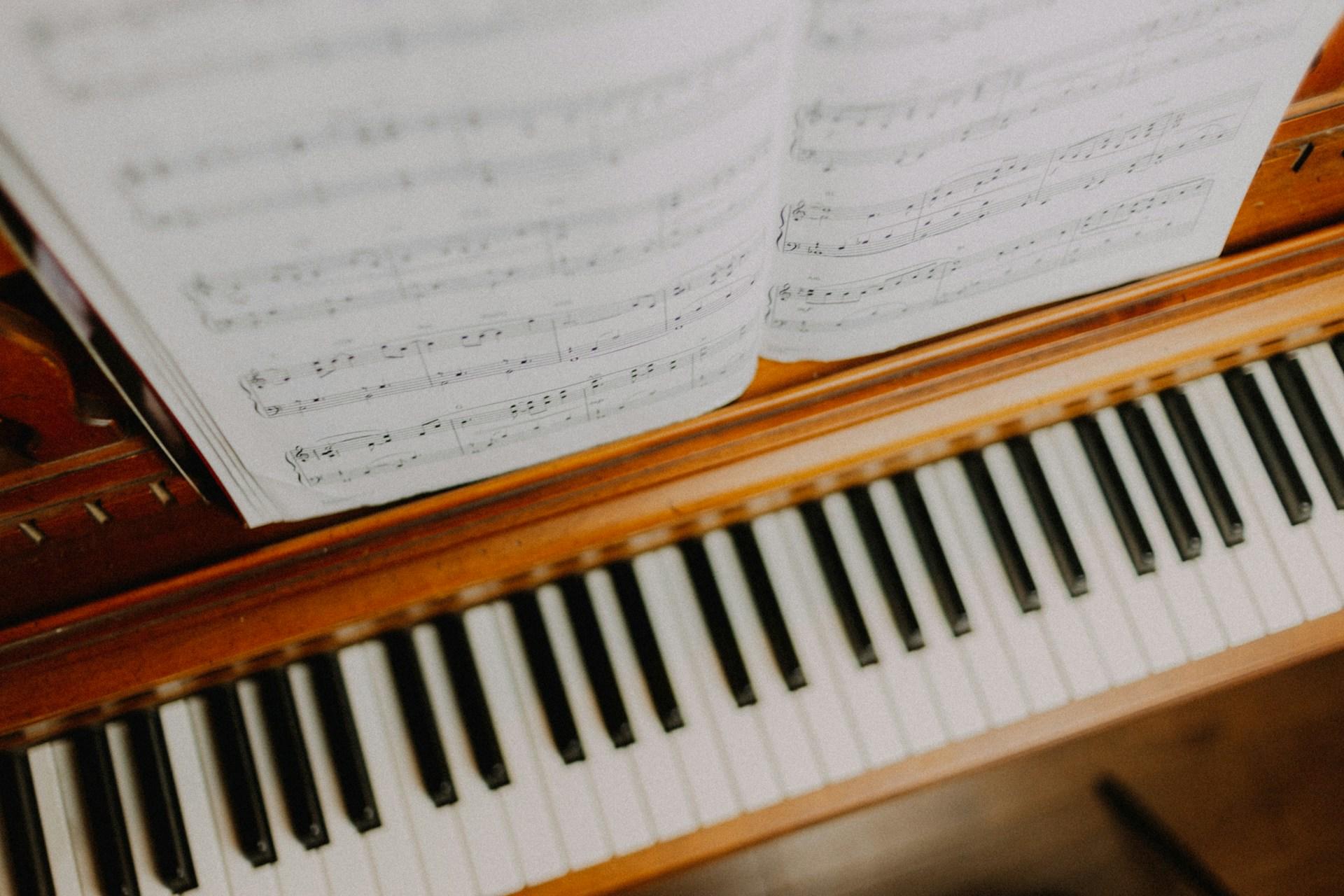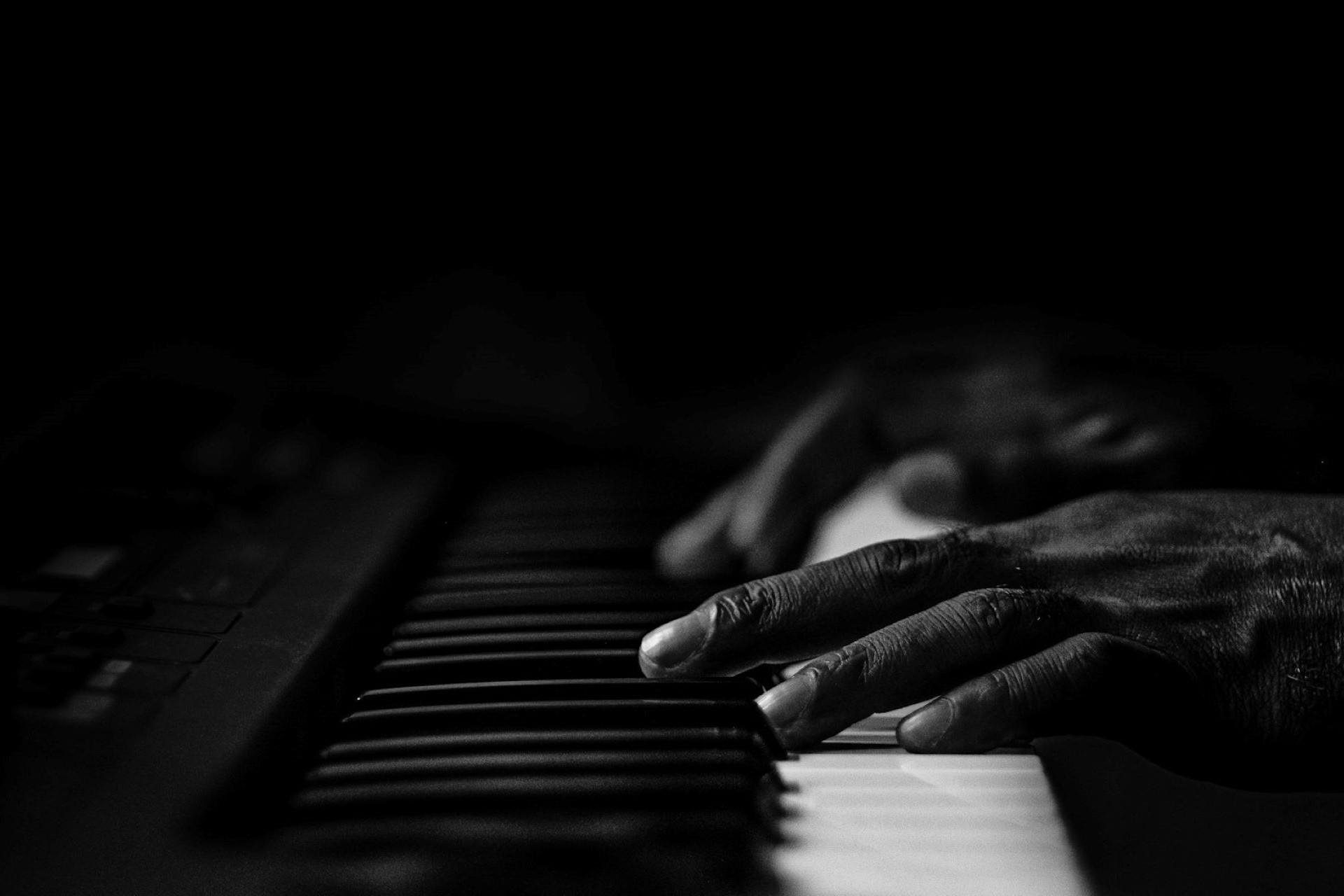Suppose you play the piano and study music through ABRSM or the Royal Conservatory of Music. In that case, your piano journey will likely be structured.
You'll have started with some pieces that are easy to play and work through the work of famous composers like Beethoven, Mozart, Bach, and Chopin, for example, with pieces getting progressively more difficult as you progress.
If you're an advanced pianist, you'll likely be at Grade 7 or 8 or an equivalent level. If you're looking for the music you should be playing, here are a few examples from these grades. Remember that these pieces are at Grade 7 or 8 and not necessarily one of the exam pieces for this year, though many of them will be or have been featured in the past.
By organizing the pieces by composer, we're inviting you to explore the works of different musical masters. This can be a great way to discover new pieces that you'll enjoy playing and that will challenge and inspire you.

Johann Sebastian Bach: 1685-1750
Anybody who studies music or piano will encounter the timeless works of the classical composers listed here numerous times throughout their studies, underscoring their pivotal role in the piano repertoire.
Johann Sebastian Bach, the German Baroque composer, is no exception. For very advanced piano players, these pieces should be part of their repertoires.
- Sinfonia No. 15 in B minor, BWV 801
- Prelude and Fugue in B, BWV 866
The technical demands of Baroque music with complex textures, ornamentation, and rapid passages make them perfectly suited for advanced pianists.
Johann Sebastian Bach's pieces, in particular, typically require advanced skills for handling multiple melodic lines simultaneously.
Ludwig van Beethoven: 1770-1827
The music of the German composer Ludwig van Beethoven needs no introduction. However, with such an extensive list of amazing works, it can sometimes be difficult to choose appropriate works.
The following works should provide both a challenge and learning opportunities for advanced pianists.
- Bagatelle in E♭ (No. 1 from Seven Bagatelles, Op. 33)
- Allegro (1st movt from Sonata in E, Op. 14 No. 1)
- Adagio cantabile (2nd movt from Sonata in C minor ‘Pathétique’, Op. 13)
These pieces offer a technical complexity with intricate fingerings, wide leaps, and complex rhythmic patterns suitable for Grades 7 and 8.
They also provide opportunities for pianists to showcase artistic interpretation.
Frédéric Chopin: 1810-1849
The Polish composer Frédéric François Chopin was one of the most famous Romantic composers for the piano. Like many of the greatest composers, however, he was also a virtuoso pianist.
Any pianist looking to improve finger dexterity, pedal control, voicing, and rubato should study Frédéric Chopin's works.
Most of Chopin's works were written for solo piano. For a piece that's suitable for advanced pianists, consider the following.
- Mazurka in A minor, Op. 17 No. 4
A mazurka is a traditional Polish dance. However, Chopin took the traditional Polish mazurka and made it his own.
Claude Debussy: 1862-1918
Claude Debussy, a French Impressionist composer, was deeply influenced by the works of Frédéric Chopin and Pyotr Ilyich Tchaikovsky. His compositions, characterized by their innovative harmonies and evocative tonal colors, would go on to inspire many later composers.
- Arabesque No. 2 (from Deux arabesques, L. 66)
The expressive depth of Debussy's Arabesque No. 2 requires advanced pianists to exhibit a high level of dynamic control and pedaling to evoke the piece's dreamy and impressionistic nature.
- Rêverie
This piece requires controlled and sensitive piano playing to perform the delicate melodies and textures found in the piece.
Wolfgang Amadeus Mozart: 1756-1791
Wolfgang Amadeus Mozart is another classical composer whose works are great for pianists and musicians of all levels.
From simple pieces for beginners to these advanced pieces, you'll learn a great deal from Mozart when played properly.
- Gigue in G, K. 574
This piece has a complex rhythmic structure, fast tempo, and required nuanced musical expression.
- Allegro (1st movt from Sonata in F, K. 332)
This is another composition that includes rapid scale runs, arpeggios, and intricate hand crossing. Pianists need to play quickly with precision and control.

Franz Liszt: 1811-1886
Franz Liszt was an incredible Hungarian Romantic composer and pianist. The virtuoso's major works are beautiful and powerful examples of what the piano can do.
In popular culture, Hungarian Rhapsody No. 2 is probably his most famous piece. It has appeared in many things, including a classic Tom & Jerry episode, "The Cat Concerto."
You should just watch pianist Yannie Tan play the piece along with the actual episode. It's a sight to behold!
In addition to watching cartoons, advanced pianists can also take a break from learning complex pieces to learn the essential piano songs that every pianist should know.
As for Franz Liszt's pieces that advanced pianists should be adding to their repertoire, we recommend the following.
- Consolation No. 5 in E (from Consolations, S. 172)
Advanced pianists will be challenged by this piece's technical passages with intricate fingerings, delicate ornamentations and subtle variations in touch and articulation.
Felix Mendelssohn: 1809-1847
The German composer Felix Mendelssohn composed music during the early Romantic period. His compositions include symphonies, concertos, piano music, organ music, and chamber music, which makes them appropriate for pianists and musicians playing other keyboard instruments, too!
- Song without Words, Op. 19 No. 1
This piece includes a beautiful and expressive melody that advanced pianists will enjoy, some challenging passages, and a wide dynamic range.
The Romantic period included a lot of lyricism, expressiveness, and harmonic richness that advanced pianists and music students must be aware of before attempting to learn such pieces.
Sergei Rachmaninoff: 1873-1943
The Russian composer Sergei Vasilyevich Rachmaninoff was an incredible pianist and composer.
While Rachmaninoff composed many pieces for piano, we have one that's part of the ABRSM Grade 8 exam that advanced pianists may want to learn.
- Moment musical in D flat, Op. 16 No. 5
This piece includes rapid passagework, complex textures, and demanding fingerings. There are also rapid descending scales and arpeggios that require precision and agility.
Robert Schumann: 1810-1856
Another Romantic composer, Robert Schumann, was famous for pieces for solo piano, voice and piano, chamber groups, orchestra, choir, and opera.
These pieces we've included here are best for advanced pianists as they're often included in Grade 7 and 8 repertoires.
- Kind im Einschlummern (No. 12 from Kinderscenen, Op. 15)
- Un poco agitato (No. 2 from Quatre pièces fugitives, Op. 15)
- Romanze in F# Major (No. 2 from Drei Romanzen, Op. 28)
Much like the other compositions from the Romantic period, like those of Mendelssohn, Schumann's compositions are intricate, with virtuosic passages with fast scales, arpeggios, and leaps across the keyboard.
Advanced pianists must be agile, precise, and tireless to play these pieces well.

Pyotr Ilyich Tchaikovsky: 1840-1893
Here, we have yet another composer from the Romantic period. The Russian composer Tchaikovsky has plenty of pieces that pianists of varying levels can enjoy, but we recommend this one for advanced pianists.
- Juin: Barcarolle (No. 6 from Les saisons, Op. 37b)
As always, these pieces offer the emotional expressiveness of Romantic compositions, melodic and harmonic complexity, and the technical challenges befitting advanced pianists.
Tchaikovsky also composed a wide range of piano pieces, making him a composer that any advanced pianist should consider exploring.
Other Advanced Piano Pieces to Add to Your Repertoire
While we've selected some of the pieces recommended for advanced pianists, if you're not planning on taking an exam, what you learn is entirely up to you. If you prefer local, in-person instruction, try searching for piano lessons near me.
The exam repertoires certainly provide a helpful list of pieces considered to be at a certain level, but you can always deviate from them.
You can listen to all the Grade 7 piano exam pieces from the ABRSM here for reference.
And the Grade 8 piano exam pieces here.
If these pieces are too difficult, then you might be an intermediate pianist. This is typically around Grades 5 and 6.
Improve Your Piano Playing with a Private Piano Tutor
Whether it's to help you improve your piano playing for an exam or just for yourself, a private piano tutor can help.
Private tutors can tailor the lessons to students without necessarily following a curriculum like the ARBSM or RCM. Of course, suppose you're working towards an exam. In that case, a private tutor can significantly help, especially if they know how the exams are graded. They can correct you on your performance pieces, point out where you're going wrong, where you can improve, and how you should do it.
Your private piano tutor can help you expand your repertoire by choosing pieces that are more to your liking, considering your taste in music. The exams generally focus on classical music, but some pieces are more contemporary and even from movie scores.
If you feel that working with a private tutor is what you need for your piano playing, search for one today on the Superprof website. You might also consider piano lessons las vegas if you're looking for local guidance.
There are plenty of talented and experienced tutors ready to help you. Browse their profiles, see what kind of piano playing they teach, and compare their rates. Many of the tutors on Superprof offer their first lesson for free, so you can even try some out before choosing the right one for you and your piano journey.
Discover piano lessons for adults when you search for tutors on Superprof today!
Summarize with AI:
















